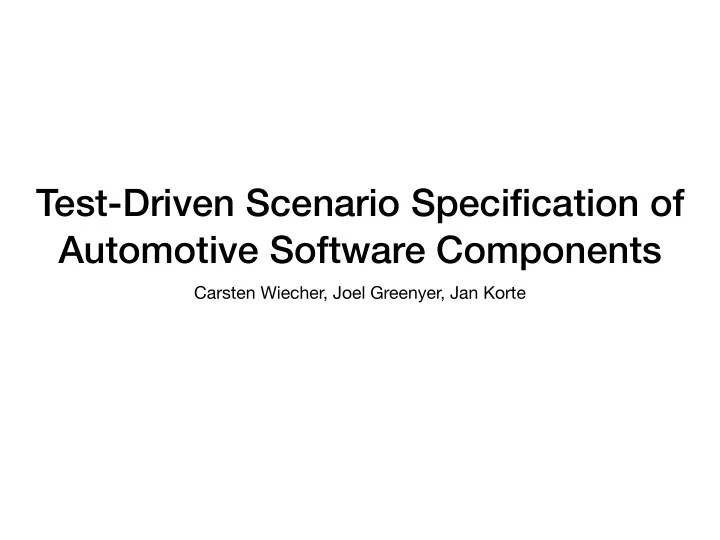

Test-Driven Scenario Specification of Automotive Software Components Carsten Wiecher, Joel Greenyer, Jan Korte
Carsten Wiecher • 6 years job experience at Leopold Kostal GmbH & Co. KG as software engineer • since 12/2018 research associate at IDiAL Institute - FH Dortmund • phd student at Paderborn University & FH Dortmund carsten.wiecher@fh-dortmund.de October 15, 2019 � 2 TDSS@MASE19
Research Context and Design Design Science Research -building and evaluating a solution- -assessing its actual impact in reality- problem analysis artifact interpretation construction artifact evaluation October 15, 2019 � 3 TDSS@MASE19
Problem Description and Motivation for TDSS complex automotive software systems A. high contextual complexity B. high dynamics in projects � costly development iterations � high verification/validation effort How to support a natural and intuitive formalization of requirements with the goal to: scenario b scenario a A. automatically analyze these requirements? B.systematically work out test cases based on these requirements? � reduce development costs by: A. early detection of requirement inconsistencies and ambiguities B.reusing test cases in later process steps October 15, 2019 � 4 TDSS@MASE19
Example: Onboard Charger for electric vehicles Req1 : No temperature related derating of the available output power shall be commanded, if the coolant inlet temperature sensor reads values between -40°C and 65°C. Req2 : If the coolant inlet temperature sensor reads values between 65°C and 75°C, linear derating with 1/10 of maximal output power per 1°C shall be commanded. Req3 : Power-down above 75°C coolant inlet temperature. Req4 : Power-down if coolant inlet temperature increases more than 5°C within 5s. Req5 : Power-down if PCB temperature increases more than 20°C within 3s. October 15, 2019 � 5 TDSS@MASE19
Background: Scenario Modeling Language for Kotlin (SMLK) scenario program scenario specification threads of scenario a behavior scenario a scenario b scenario c scenario b -scenarios- scenario c Req1 : No temperature related derating of the available output power shall be commanded, if the coolant inlet temperature sensor reads values between -40°C and 65°C. scenario (deratingComponent.startCycle) { if (deratingComponent. coolantTemp in -40..65) request(deratingComponent.setDeratingFactor(1.0)) } Behavioral Programming: http://www.wisdom.weizmann.ac.il/~bprogram/ Live Sequence Charts: http://wiki.weizmann.ac.il/playgo/index.php/Live_sequence_charts Scenario Modeling Language: http://scenariotools.org/scenario-modeling-language/ October 15, 2019 � 6 TDSS@MASE19
Background: Scenario Modeling Language for Kotlin (SMLK) scenario program scenario a scenario b scenario c scenario d request wait-for forbid interrupt scenario a scenario b scenario c sync point request(a) request(b) wait-for(c) sync point request(c) October 15, 2019 � 7 TDSS@MASE19
Test-Driven Scenario Specification of Automotive Software Components (TDSS) request, wait-for, forbid, interrupt specific events to model the behavior of the software component request external events (e.g. temperature values) Test Scenario Scenario Program Program wait for scenario program events (e.g. expected derating factor) October 15, 2019 � 8 TDSS@MASE19
Test-Driven Scenario Specification of Automotive Software Components (TDSS) @Test fun `At 66°C the DeratingFactor is 0-9`() = runTest ( deratingScenarioProgram ) { deratingIOSequence (Triple(66, 66, 0.9)) } Test request(temperature values) Scenario Program request(start cycle) waitFor(derating value) Derating waitFor(end cycle) cycleScenario (deratingComponent) { if (deratingComponent. coolantTemp in 65..75) request(deratingComponent.setDeratingFactor( (75.0-deratingComponent. coolantTemp )/10)) } October 15, 2019 � 9 TDSS@MASE19
Test-Driven Scenario Specification of Automotive Software Components (TDSS) test passed all tests passed execute this extend or write a new execute all clean up new test adapt test case test cases case specification test all req. failed modeled tests failed req. remain to be modeled October 15, 2019 � 10 TDSS@MASE19
Test-Driven Scenario Specification of Automotive Software Components (TDSS) scenario a scenario b cycleScenario (deratingComponent) { if (deratingComponent. coolantTemp in 65..75) request(deratingComponent.setDeratingFactor( (75.0-deratingComponent. coolantTemp )/10)) } October 15, 2019 � 11 TDSS@MASE19
TDSS - Evaluation Req1 : No temperature related derating of the available output power shall be commanded, if the coolant inlet temperature sensor reads values between -40°C and 65°C. Software Software Requirements Req4 : Power-down if coolant inlet temperature Qualification Test Analysis increases more than 5°C within 5s. Software Software Architectural Integration and Design Integration Test Software Software Unit Detailed Design Verification and Unit Construction October 15, 2019 � 12 TDSS@MASE19
TDSS - Summary Test-Driven Scenario Specification of Automotive Software Components: • new approach for the test-driven, scenario-based requirements specification • combines agile practices with formal specification and analysis • SMLK is suited to formalize functional requirements in an intuitive way • immediately testing of requirements: • feeling of control to the requirements specification and analysis phase • high confidence of correctness when the final implementation is tested: tests vs. requirements vs. implementation October 15, 2019 � 13 TDSS@MASE19
Outlook 1. Combinatorial Test Design 1. Scenario 2. Transition to Design Specification 3. Transition to Validation 1 4. Evaluation: based on DSR framework, Test systematically assessing the impact in Scenario reality Specification 1. XIL 4 experimental setting 3 study subjects test group control group 1. 2 researcher researcher artifacts (planning) (conducting) constructs, methods, models experimental results October 15, 2019 � 14 TDSS@MASE19
Recommend
More recommend